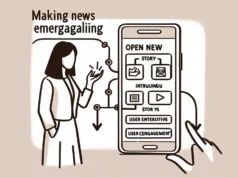In the ever-evolving landscape of technology, the advent of 5G stands as a monumental leap, particularly for the field of online journalism. This article delves into the multifaceted impacts of 5G on online journalism, exploring how this breakthrough in internet speed and connectivity is set to revolutionize the way news is reported and consumed.
The Dawn of 5G: A Game Changer for Online Journalism
5G, the fifth generation of mobile networks, is not just a step up from its predecessor, 4G, but a giant leap forward. With potential speeds up to 100 times faster than 4G, 5G promises to bring about significant changes in various sectors, including online journalism.
Enhanced Speed and Efficiency in News Reporting
One of the most immediate impacts of 5G on online journalism is the significant increase in speed and efficiency of news reporting. Reporters in the field will be able to upload high-quality videos and images in real-time, without the delays and buffering issues associated with slower networks. This means breaking news can be reported more quickly and with richer multimedia content, providing audiences with a more immersive and comprehensive understanding of unfolding events.
Transforming Live Reporting and Broadcasting
Live reporting is set to undergo a transformation with 5G. Journalists will be able to broadcast high-definition live streams from their mobile devices, making live reporting more accessible and less dependent on expensive and cumbersome broadcasting equipment. This democratization of live broadcasting could lead to a surge in on-the-spot reporting, bringing viewers closer to the news as it happens.
The Rise of Immersive Journalism
5G opens new avenues for immersive journalism. Technologies like Virtual Reality (VR) and Augmented Reality (AR), which require high bandwidth and low latency, will become more feasible and widespread. Journalists can create immersive stories that allow audiences to experience news events virtually, offering a deeper emotional and cognitive connection to the stories.
Enhancing Audience Engagement
With faster internet speeds, online news platforms can offer more interactive and engaging content. Enhanced interactivity, such as real-time polling, interactive infographics, and AI-driven personalized news feeds, can significantly improve user engagement and the overall news consumption experience.
Challenges and Considerations
While the benefits of 5G are evident, it also brings challenges that need addressing. Concerns over digital divide, cybersecurity, and the need for massive infrastructure investment are among the issues that warrant attention. Additionally, the accelerated spread of information raises concerns about the dissemination of misinformation and the need for robust fact-checking mechanisms.
Conclusion: Shaping the Future of Journalism
The introduction of 5G technology is poised to reshape online journalism in profound ways. By enabling faster transmission of information, supporting advanced technologies, and enhancing audience engagement, 5G will undoubtedly change how news is reported and consumed. However, it is crucial for stakeholders in the journalism industry to navigate the challenges that come with these advancements to fully harness the potential of 5G in enriching the landscape of online journalism.
As we stand on the cusp of this technological revolution, it’s clear that 5G will not just accelerate the speed at which news travels, but also transform the very nature of how we tell and receive stories. The future of online journalism, in the era of 5G, looks both exciting and transformative.






